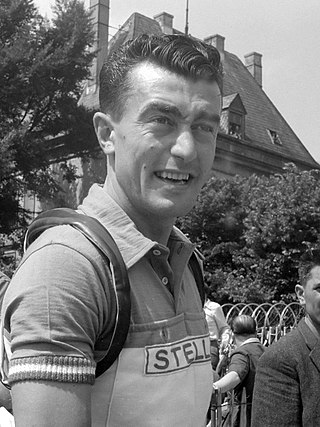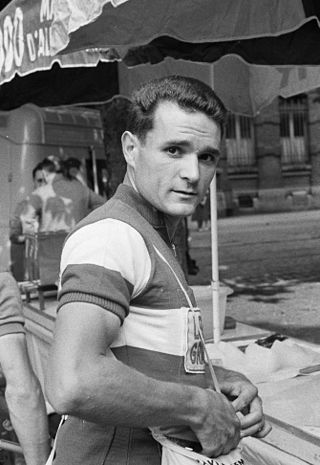Related Research Articles

Louis "Louison" Bobet was a French professional road racing cyclist. He was the first great French rider of the post-war period and the first rider to win the Tour de France in three successive years, from 1953 to 1955. His career included the national road championship, Milan–San Remo (1951), Giro di Lombardia (1951), Critérium International, Paris–Nice (1952), Grand Prix des Nations (1952), world road championship (1954), Tour of Flanders (1955), Critérium du Dauphiné Libéré (1955), Tour de Luxembourg (1955), Paris–Roubaix (1956) and Bordeaux–Paris (1959).

Jacques Anquetil was a French road racing cyclist and the first cyclist to win the Tour de France five times, in 1957 and from 1961 to 1964.

Rudi Altig was a German professional track and road racing cyclist who won the 1962 Vuelta a España and the world championship in 1966. After his retirement from sports he worked as a television commentator.

Charly Gaul was a Luxembourgian professional cyclist. He was a national cyclo-cross champion, an accomplished time triallist and superb climber. His ability earned him the nickname of Angel of the Mountains in the 1958 Tour de France, which he won with four stage victories. He also won the Giro d'Italia in 1956 and 1959. Gaul rode best in cold, wet weather. In later life, he became a recluse and lost much of his memory.

Johannes Adrianus "Jan" Janssen is a Dutch former professional cyclist (1962–1972). He was world champion and winner of the Tour de France and the Vuelta a España, the first Dutch rider to win either. He rode the Tour de France eight times and finished all but the first time. He won seven stages and wore the yellow jersey for two days. He was easily spotted in the peloton because of his blond hair and his glasses.

The 1964 Tour de France was the 51st edition of the Tour de France, one of cycling's Grand Tours. It took place between 22 June and 14 July, with 22 stages covering a distance of 4,504 km (2,799 mi). Stages 3, 10 and 22 were all two-part stages with the first half being a regular stage and the second half being a team or individual time trial. It was the only Tour de France to include a mid-stage climb to the Alpe d'Huez ski resort. The race was eventually won by Jacques Anquetil following an epic shoulder-to-shoulder battle with Raymond Poulidor during stage 20.

The 1960 Tour de France was the 47th edition of the Tour de France, one of cycling's Grand Tours. It took place between 26 June and 17 July, with 21 stages covering a distance of 4,173 km (2,593 mi). The race featured 128 riders, of which 81 finished, and was won by the Italian Gastone Nencini.

Raphaël Géminiani is a French former road bicycle racer. He had six podium finishes in the Grand Tours. He is one of four children of Italian immigrants who moved to Clermont-Ferrand fleeing from fascist violence. He worked in a cycle shop and started racing as a boy. He became a professional and then a directeur sportif, notably of Jacques Anquetil and the St-Raphaël team.

Florent Brard is a retired French road bicycle racer. He won three national championships, including the professional road race. He became a professional in 1999 and stopped racing in November 2009 after not finding a place in a team.

Seamus "Shay" Elliott was an Irish road bicycle racer, Ireland's first major international rider, with a record comparable only to Sean Kelly and Stephen Roche. He was the first Irish person to ride the Tour de France, first to win a stage, and first to wear the yellow jersey, and first English speaker to win stages in all the Grand Tours.

Henry Anglade was a French cyclist. In 1959 he was closest to winning the Tour de France, when he won a stage and finished second, 4:01 behind Federico Bahamontes. In 1960 he wore the yellow jersey for two days while finishing 8th overall. He placed in the top five of the Tour on two additional occasions in 1964 and 1965.
Arthur Metcalfe was a British racing cyclist who twice rode the Tour de France and, as an amateur remains the only male rider to win the British road race championship and the British Best All-Rounder (BBAR) time trial competition in the same year.

Marcel Bidot was a French professional road bicycle racer who won two stages of the Tour de France and became manager of the French national team. He led the team in 12 Tours and won six of them.
Anthony 'Tony' Hewson was a British racing cyclist who rode the Tour de France and, as an amateur, won the Tour of Britain in 1955. He was critical of the way, as he saw it, British cycling has been let down by its administrators.
Rachel Dard was a French professional cyclist said to have raced across France to avoid a positive dope finding and ended up in a row which exposed organised drug-taking in cycling in the 1970s. His sporting career began with ACBB Paris.

Vincent Denson is a former professional racing cyclist who rode the Tour de France, won a stage of the Giro d'Italia and won the Tour of Luxembourg in the 1960s.
Johny Schleck is a former professional cyclist from Luxembourg.
Maurice De Muer was a French cyclist who rode as a professional between 1943 and 1951 and later became a cycling team manager.
References
- 1 2 Archives, Cycling. "Pelforth - Sauvage - Lejeune 1964".
- 1 2 3 4 5 6 7 8 9 10 11 Sporting Cyclist, UK, March 1967
- 1 2 3 4 5 Fotheringham, William (2005), Roule Britannia, Yellow Jersey, UK
- ↑ "Cyclisme Sport - Résultats de cyclisme - Vainqueurs d'étapes du Tour de l'Avenir". Archived from the original on 13 November 2008. Retrieved 5 October 2008.
- ↑ "Cyclisme : la fiche coureur de ALAN RAMSBOTTOM".
- 1 2 "Professional Cycling Palmarès Site | Races: English speaking riders at the Tour de France". Archived from the original on 2 June 2010. Retrieved 18 January 2010.
- ↑ "Cyclisme sur route - Alan Ramsbottom (Grande Bretagne)".
- ↑ "Cycling Weekly: Cycling News, Bike Reviews, Sportives & Forums".
- 1 2 "Courses en circuit - année 1964". Archived from the original on 4 July 2008. Retrieved 2008-10-05.
- ↑ "Courses en circuit - année 1965". Archived from the original on 23 February 2012. Retrieved 2008-10-05.
- ↑ Perrier bottles were handed to riders at the end of Tour de France stages for years